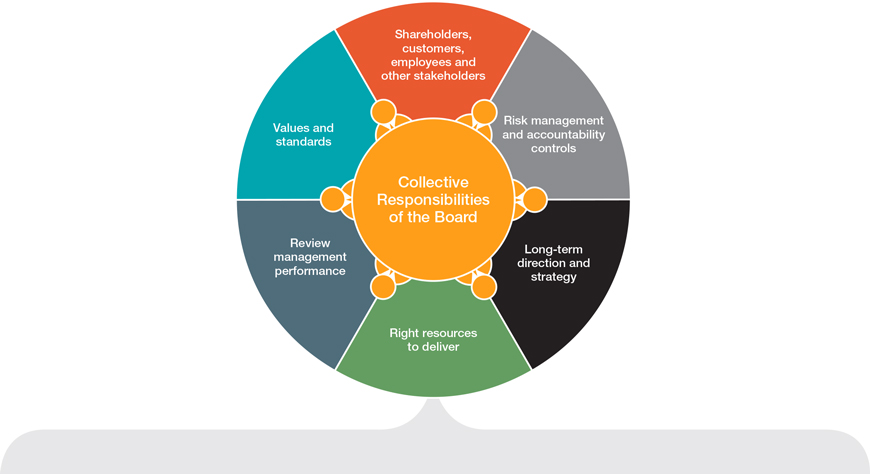The Role of the Board

| Responsibility | Specific Actions |
|---|
| Shareholders, customers, employees and other stakeholders. | Acting in the best interests of the Company to generate value for shareholders. | Monitoring material customer service issues including resultant activities, e.g. Which report, Service Revolution. | Employee engagement survey, review of bonus scheme and whistleblowing process. |
| Risk management and accountability controls. | Consideration and approval of all regulatory and statutory announcements, including those pertaining to results and dividends. | Review of the risk management strategy and systems of internal controls. | Approval of corporate governance arrangements and policies, including Group Treasury and Tax Strategy and Policy documents, Health & Safety policy, and introduction of tighter delegated authority arrangements. |
| Long-term direction and strategy. | Two full days dedicated to strategy discussions. | Regular review of forecast versus actual financial performance. | Regular updates on the progress of key strategic initiatives. |
| Right resources to deliver. | Consideration of commercial initiatives such as logistics and business systems improvements. | Monitoring of colleague retention data. | Implementation of a regular colleague engagement survey and analysis of results. |
| Management performance. | Clear division of responsibilities between Chairman and Chief Executive available on our Corporate website.* | Regularly reviewing of standard agenda and special management reports. | Interlinking of management performance to non-financial, as well as financial, KPIs. |
| Values and standards. | CSR and Community programmes e.g. Bikeworks, Charity Partnerships, Kids Holiday Bike Clubs | More frequent visits by the Non-Executive Directors to stores, autocentres and the Support Centre. | Introduction of regular meetings between colleagues and senior management. |
* From 18 July 2012 to 21 November 2012 Dennis Millard held the role of both Chairman and Chief Executive when he stood in as Interim Executive Chairman following David Wild's departure.
The Company has appropriate Directors' Liability Insurance in place.
The table below shows the composition of the Board and its Committees, and sets out the number of meetings attended by each individual throughout the period.
| The Board† | | | Meeting Attendance
* indicates attendance by invitation |
|---|
| Role | Date of Appointment | Board | Audit
Committee | Remuneration Committee | Nomination Committee |
|---|
| Board Member | | | Scheduled: 14 | Scheduled: 3 | Scheduled: 6 | Scheduled: 3 |
|---|
| Dennis Millard | Chairman and Chair of Nomination Committee | 28 May 2009 | 14 | 3* | 6 | 3 |
| Matt Davies | Chief Executive (current) | 4 October 2013 | 3 | 1* | 2* | 1 |
| David Wild | Chief Executive (former) | 4 August 2008 | 7 | 2* | 2* | n/a |
| Andrew Findlay | Finance Director | 1 February 2011 | 14 | 3* | n/a | n/a |
| Paul McClenaghan | Commercial Director (former) | 31 March 2007 | 13 | 2* | n/a | n/a |
| Bill Ronald | Senior Independent Director | 17 May 2004 | 14 | 3 | 6 | 3 |
| David Adams | Non-Executive Director and Chair of Audit Committee | 1 March 2011 | 13 | 3 | 6 | 3 |
| Claudia Arney | Non-Executive Director | 25 January 2011 | 14 | 3 | 6 | 3 |
| Keith Harris | Non-Executive Director and Chair of Remuneration Committee | 17 May 2004 | 14 | 3 | 6 | 3 |
† Includes David Wild who resigned on 18 July 2012, Matt Davies who was appointed on 4 October 2012 and Paul McClenaghan who resigned on 12 April 2013.
The Board recognises that it is preferable that the position of Chairman and Chief Executive are not held by the same individual and maintains a clear division of the responsibilities of these two roles. However, from 18 July 2012 to 21 November 2012 Dennis Millard acted as Interim Executive Chairman whilst the Company undertook a search for a new Chief Executive. It was felt that Dennis Millard was best placed to lead the Company during this brief period of four months due to his knowledge and experience of the Company. Following the presentation of the Group's interim results on 21 November 2012 the Company returned to the position of having a separate Chairman and Chief Executive in compliance with the UK Corporate Governance Code.
Non-Executive Directors
The Non-Executive Directors are responsible for providing independent challenge and rigour to deliberations by:
- contributing to strategy discussions;
- considering the reporting of performance by managers against agreed goals and objectives, and providing critique where necessary;
- ensuring the financial information, risk management and controls processes of the Group are appropriately vigorous;
- undertaking regular meetings with senior management and periodic visits to stores and autocentres;
- meeting together regularly without the Executive Directors present; and
- considering Executive Director remuneration and succession planning.
The Senior Independent Director, Bill Ronald:
- is available to act as an intermediary for the other Directors or a sounding board for the Chairman as required;
- leads meetings with the other Non-Executive Directors without the Chairman at least annually to appraise his performance; and
- can be contacted by shareholders if direct contact with the Chairman, Chief Executive or other Executive Directors has not alleviated their concerns, or if such contact would not be appropriate.
Concerns over any unresolved business can be recorded on behalf of a Director in the minutes of the relevant meeting. At the time of resignation, a Non-Executive Director is able to raise any concerns in a written letter to the Chairman who will bring such concerns to the attention of the Board.